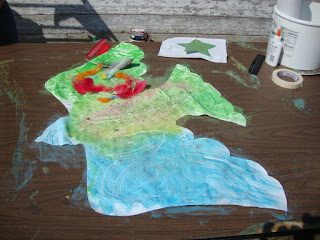Today's primary announcements:
1) Be sure to bring your soup cans filled with coins next week for Covenant World Relief.
2) There is a sign-up sheet in the back of the sanctuary regarding how you wish to help our adopted family for Christmas. Our church desires to make Christmas special for a needy family with five children.
 After the offering was taken, there was a dedication ceremony for Aarilyn Marie MacGregor, always a special time in the life of our fellowship.
After the offering was taken, there was a dedication ceremony for Aarilyn Marie MacGregor, always a special time in the life of our fellowship.Today's Scripture reading was taken from Isaiah 64:1-9. Brad then called all the children forward to read them the Christmas Story as it is relayed to us in the Gospel of Luke. Prayer for the needs of the church family followed and then Pastor Brad began his message.
The Old Familiar Story
Brad began by asking if any of us have experienced "buyer's remorse." Nearly everyone was familiar with the concept, and he compared it to the feeling many of us feel the first week of January when someone asks, "How was your Christmas?" All too often we're frustrated because we expected too much or got too busy. Instead of having given to the poor or reaching out to friends or doing other things of value, we all too often feel like we missed the point of it all, again.
"What if we decide that this year we're going to covenant together to get it right?" he said.
Before presenting his points he noted that this message was just as much for himself as for us. Too often we can get caught up in Christmas parties and other activities, never really taking time to read and contemplate the Christmas story.
Brad shared with us these words from his favorite Christmas card:
If our greatest need had been information, God would have sent us an educator; If our greatest need had been technology, God would have sent us a scientist; If our greatest need had been money, God would have sent us an economist; If our greatest need had been pleasure, God would have sent us an entertainer; But our greatest need was forgiveness, so God sent us a Savior.
At the front of the church Brad had set out some items that would be familiar to most of us at this time of year. He wanted us to use these as object lessons for remembering some critical concepts or truths.
1) Nativity Scene
Pastor Brad shared a couple of the thoughts he's had when driving past a nativity scene in someone's yard. "Who's got the time to put that up?" he said... and "Where do they store all that stuff the rest of the year?"
Then he gave us a new thought to call to mind every time we see a nativity scene: THIS REALLY HAPPENED IN HUMAN HISTORY.
There was a time when God came into this world in human form, and amazing event that is the centerpiece of our faith. So when we see a Nativity creche, Brad encourages us to remember, "This really happened in human history, and it happened for me."
2) Christmas Music
 Next, Brad showed us a Christmas CD. All too often Christmas music is nothing more than background noise for shopping or whatever else we're doing this time of year. We can choose to tune it out or allow it to affect us.
Next, Brad showed us a Christmas CD. All too often Christmas music is nothing more than background noise for shopping or whatever else we're doing this time of year. We can choose to tune it out or allow it to affect us.Brad suggested that we tether this music to the very first Christmas carol: "Glory to God in the highest. Peace on earth and good will towards men."
3) Christmas Cards
When we get a card it is nice to know we are on somebody's friendship list. But here's a verse that adds a dimension to this thought, John 15:5.
"I no longer call you servants, because a servant does not know his master's business. Instead, I have called you friends, for everything that I learned from my Father I have made known to you."
"We're on God's friendship list," Brad said. God is a flawless friend.
4) Credit Card
Brad showed us his credit card, which a lot of people use this time of year. He asked us not to write down his card numbers right after showing it. The thought he wanted to sink home was what we should do during those 20 seconds after our card is swiped at a store, while the card info is being processed when making a purchase.
We all know how they work. We use the card now, and pay the bill later. That's the part that hurts. This year, whenever we're using our credit or debit cards, Brad wants us to say, "My moral debt that came due one day & Jesus came and paid it... and it hurt Him."
5) Presents
Brad then showed us a wrapped gift, a present. Sometimes presents are hard to accept. But what good is unexpressed love? People who love give. Love motivates giving.
What I needed most in my life was forgiveness. And it came my way as a gift.
Jesus Christ is God's Christmas gift to you and to me. God saw this broken world and came to us as a gift. As we open gifts say, "What an unbelievable God we worship."
"My prayer," Brad said, "is that we would get this Christmas right."





